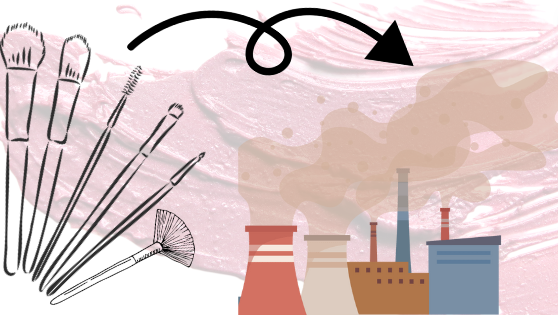In the pursuit of beauty, consumers often neglect to consider the environmental toll caused by cosmetic consumption. From the shimmering shelves of beauty aisles to the depths of oceanic ecosystems, it’s imperative to realize that the consequences of cosmetic waste ripple far beyond the mirror.
Cosmetic waste, including both packaging and leftover products, contributes significantly to pollution and landfill overflow. In the popularizing world of beauty, single-use plastics and non-recyclable materials reign supreme, continuing a cycle of environmental devastation. The cosmetic industry uses approximately 120 billion units of plastic packaging each year, comprising bottles, tubes, and containers. Notably, 70% of this packaging finds its way into landfills, exacerbating the already critical challenge of waste management.
When shopping for cosmetic products, it’s important to be wary of certain brands that have been accused of greenwashing. Bondi Sands’, L’Oreal, SKKN’s, Head & Shoulders’, and Lilly Lashes are among those that have faced such allegations. In definition, greenwashing involves making a product seem less harmful to the environment than it actually is. As such, it’s best to steer clear of these brands and refrain from using their products until improvements have been implemented.
In the halls of Arcadia High School (AHS), makeup has become a routine part of many students’ daily lives. From morning touch-ups in the restroom mirrors to after-school events, cosmetics play a significant role in self-expression and confidence for students. However, as students apply their favorite lipstick and mascara, little thought may be given to the plastic packaging that will inevitably end up in landfills or the microplastics that find their way into water systems. It’s imperative to realize that cosmetic containers often contain a mix of materials, including plastics, glass, and metals, that require challenging recycling efforts. The difficulty in separating and recycling these materials thus leads to increased waste.
“I see so many people using makeup daily, and I don’t think many of them know the severity of its environmental impacts,” stated freshman Hailee Gonzalez. “I think that this problem should definitely be shed light on so that everyone has some kind of knowledge when it comes to choosing their makeup brand.”
Beyond the visible packaging lies an invisible threat to ecosystems worldwide: microplastics. These tiny particles, often found in exfoliating scrubs, glittering eyeshadows, and other cosmetic formulations, pose a significant risk to marine life and biodiversity. As cosmetic products wash down drains and into waterways, these microplastics infiltrate marine ecosystems, thus threatening aquatic organisms and disrupting ecological balance. Today, despite growing awareness of microplastic pollution, regulatory measures remain insufficient to address the presence of these pollutants in cosmetic formulations.
“Thinking about this problem made me realize I never stop to think about the detrimental effects that the simple act of using cosmetics poses on the environment,” said junior Jolin Chang. “I think that it really is crucial that this becomes more acknowledged so that everyone can make more informed decisions.”
In addition to microplastics, phthalates, and parabens are among the many hazardous substances found in cosmetics that pose a threat to both human and environmental health. These chemicals, commonly used as preservatives and fragrance enhancers, have been linked to hormone disruption, reproductive disorders, and developmental issues. When washed down drains or discarded into landfills, these toxins leach into soil and water, posing a threat to ecosystems and wildlife. Despite evidence of the harmful effects of these chemicals, regulatory systems remain deficient, leaving consumers vulnerable to exposure.
“I never thought that makeup containers would be especially difficult to recycle,” said junior Nandielyn Dela Cruz. “It’s scary to think about how we’re the ones harming ourselves because of what we choose to purchase.”
As the beauty industry grapples with its environmental footprint, consumers hold the power to create a tangible effect through advocacy and making informed choices. By prioritizing sustainable beauty alternatives, supporting eco-conscious brands, and advocating for stricter regulations, individuals can mitigate the environmental influence of cosmetic usage. Companies such as REN, Lush, Herbivore, Weleda, and Clarins are leading the way by taking responsibility for their actions and reducing their environmental footprint. Here at AHS, fostering a sense of sustainability and consumer awareness is crucial to addressing the consequences of beauty and protecting our planet for future generations.
“After finding out about this problem a while ago, I started researching and only purchasing from companies that take the environment into consideration when it comes to packaging and the product itself,” reflected sophomore Kyan Chang. “I hope that more people can be better informed about this problem and understand that their actions do play an important role in shaping the world we live in today.”
In conclusion, the appeal of beauty comes at a hidden cost to our environment, taking the shape of cosmetic waste pollution, microplastic contamination, and toxic chemical exposure. By gaining an informed understanding of cosmetic consumption and its environmental implications, we can pave the way for a more sustainable and conscientious approach to beauty. To ensure the planet and our personal well-being thrive, let’s advocate for change in the beauty industry and beyond.







